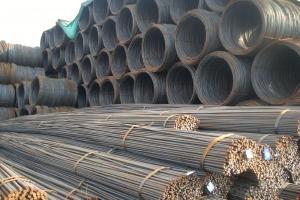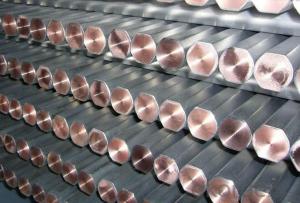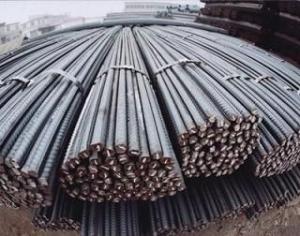Steels Manufacture Building Material Construction with Good Quality on Sale
- Loading Port:
- Tianjin
- Payment Terms:
- TT OR LC
- Min Order Qty:
- 100 m.t
- Supply Capability:
- 1000 m.t/month
OKorder Service Pledge
OKorder Financial Service
You Might Also Like
1.Packaging & Delivery
Packaging Detail: | in bundles or as customer's requirement |
Delivery Detail: | Within 30days after receiving your deposit or copy of L/C |
2.Specifications
HRB400,HRB500 Steel Rebars
1.China direct supplier
2.Best service
3.Competitive price
4.Quantity assured
3.Product Description
Name | High Tensile Export Reinforcing Steel Bar ,Deformed Steel Bar ,HRB400B,HRB,46B,HRB500 Building Construction Material |
Standard | ASTM A615 /BS BS 4449 /GB HRB/ JIS G3112 |
Grade | A615 Gr40/60/75 BS 4449 Gr460,B500 GB HRB335,HRB400 ,HRB500
JIS G3112 SD390
|
Diameter | 6mm-40mm |
Length | 6-12m |
Technique | Low temperature hot-rolling reinforcing deformed steel rebar |
Tolerance | As the standard or as your requirement |
Application | Building, construction, road, bridge,etc |
Certificated | BV |
MOQ | 500tons per size steel rebar |
Packing details | Steel rebar packed in bundle or as your requirement |
Delivery | Within 30 days after deposit |
Payment | T/T or L/C |
4.Chemical Composition
Grade | Technical data of the original chemical composition (%) | |||||||
C | Mn | Si | S | P | V | |||
HRB400 | ≤0.25 | ≤1.60 | ≤0.80 | ≤0.045 | ≤0.045 | 0.04-0.12 | ||
Physics capability | ||||||||
Yield Strength(N/cm2) | Tensile Strength(N/cm2) | Elongation (%)
| ||||||
≥400 | ≥470 | ≥14 | ||||||
Grade | Technical data of the original chemical composition (%) | |||||||
C | Mn | Si | S | P | V | |||
HRB500 | ≤0.25 | ≤1.60 | ≤0.80 | ≤0.045 | ≤0.045 | 0.04-0.12 | ||
Physics capability | ||||||||
≥500 | ≥630 | ≥12 | ||||||
5. Theorectical weight
Diameter (MM) | Cross Sectional Area (MM2) | Theorectical Weight (KG/M) | Weight of 12M Bar (KG) | A Ton Contains 12M Bars (PCS) |
6 | 28.27 | 0.222 | 2.664 | 375.38 |
8 | 50.27 | 0.395 | 4.74 | 210.97 |
10 | 78.54 | 0.617 | 7.404 | 135.06 |
12 | 113.1 | 0.888 | 10.656 | 93.84 |
14 | 153.9 | 1.21 | 14.52 | 68.87 |
16 | 201.1 | 1.58 | 18.96 | 52.74 |
18 | 254.5 | 2 | 24 | 41.67 |
20 | 314.2 | 2.47 | 29.64 | 33.74 |
22 | 380.1 | 2.98 | 35.76 | 27.96 |
25 | 490.9 | 3.85 | 46.2 | 21.65 |
28 | 615.8 | 4.83 | 57.96 | 17.25 |
32 | 804.2 | 6.31 | 75.72 | 13.21 |
36 | 1018 | 7.99 | 98.88 | 10.43 |
40 | 1257 | 9.87 | 118.44 | 8.44 |
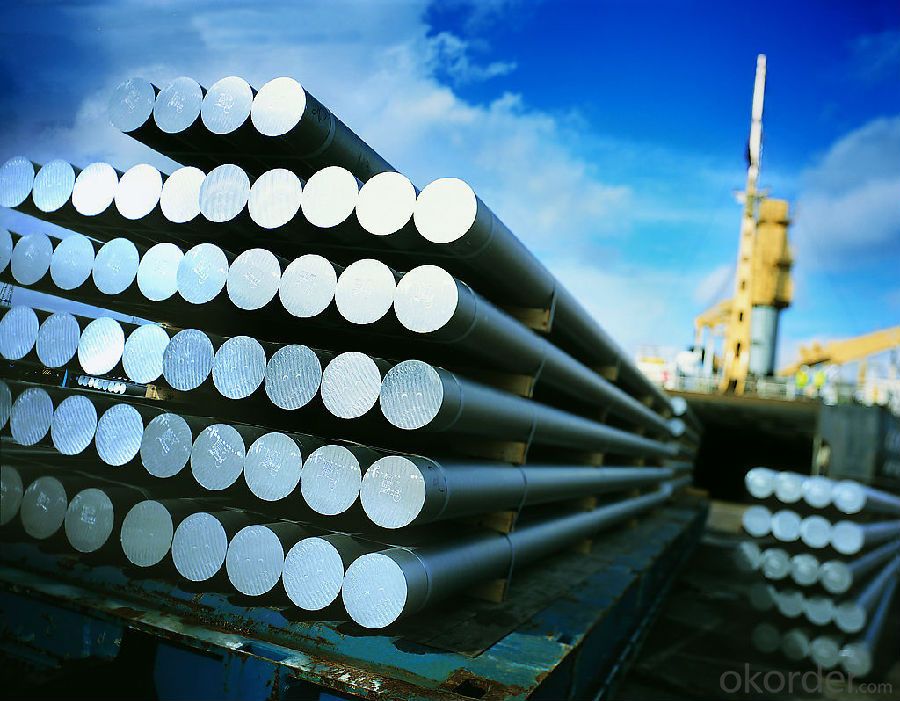
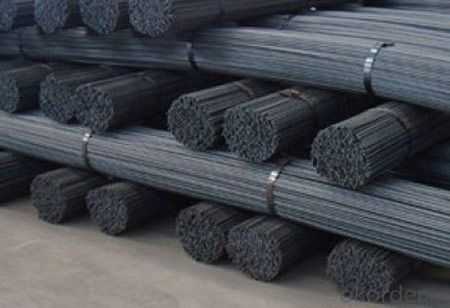
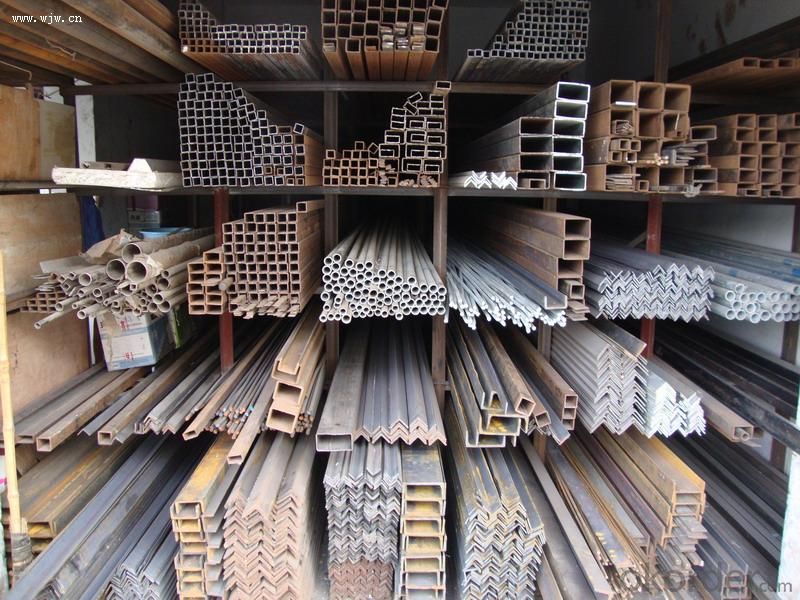
- Q:What does carbon seamless steel pipe mean? What is the difference between a seamless 20# and an ordinary one? What is it used in detail?
- Carbon steel is actually relative to alloy steel, mainly carbon content, and 20# seamless steel is carbon steel! In addition, there are stainless steel, stainless steel is considered a kind of alloy steel, but the processing is not the same, the performance is not the same, good looking outside!The description of the material in alloy steel is actually the content of the metal elements in the steel (usually the percentage number).
- Q:What is the thickness of steel pipes?
- The thickness of steel pipes can vary depending on the specific application and industry requirements. However, typical steel pipes used in various industries, such as construction and oil and gas, can have thicknesses ranging from a few millimeters to several centimeters.
- Q:Can steel pipes be used for conveying oil?
- Steel pipes are suitable for the transportation of oil. In the oil and gas industry, steel pipes are widely utilized for the conveyance of oil due to their robustness, longevity, and resistance to corrosion. The exceptional strength of steel pipes enables them to endure the demanding conditions of high pressure and temperature that often accompany oil transportation. Furthermore, steel pipes are less susceptible to leakage and damage in comparison to alternative materials, thus making them a dependable choice for the efficient transfer of oil over extensive distances. Moreover, the sleek interior surface of steel pipes aids in reducing friction and improving the oil flow. Overall, steel pipes are the preferred option for oil transportation owing to their superior mechanical properties and enduring performance.
- Q:How are steel pipes installed underground?
- Steel pipes are installed underground through a process called trenchless installation or open trench excavation. In trenchless installation, a drilling machine creates a tunnel underground, and the steel pipes are then inserted into the tunnel using a technique called pipe jacking or horizontal directional drilling. In open trench excavation, a trench is dug, and the steel pipes are laid in the trench before being covered with backfill material.
- Q:How can steel pipes be protected from corrosion?
- Steel pipes can be protected from corrosion through various methods. One common method is the application of protective coatings. These coatings act as a barrier between the steel and corrosive elements in the environment. The most widely used protective coating for steel pipes is epoxy, which provides excellent resistance to corrosion. Other coatings such as polyethylene and polyurethane can also be used depending on the specific application and requirements. Another effective way to protect steel pipes from corrosion is by cathodic protection. This technique involves the use of sacrificial anodes or impressed current systems to prevent corrosion. Sacrificial anodes, typically made of zinc or aluminum, are attached to the steel pipes. These anodes corrode instead of the steel, sacrificing themselves to protect the pipes. Impressed current systems, on the other hand, use a direct electrical current to counteract the corrosion process. Regular maintenance and inspection are crucial in the protection of steel pipes from corrosion. Monitoring the condition of the coatings, checking for any signs of damage or deterioration, and promptly addressing any issues can help prevent corrosion from occurring or spreading. Additionally, implementing proper drainage systems to avoid the accumulation of moisture around the pipes can further protect them from corrosion. Lastly, environmental factors should be taken into consideration when protecting steel pipes from corrosion. This includes mitigating exposure to corrosive substances, such as acids or chemicals, and ensuring proper ventilation and airflow to prevent the buildup of moisture and humidity. By implementing a combination of these protective measures, steel pipes can have an extended lifespan and maintain their structural integrity.
- Q:What is the maximum diameter of steel pipes?
- The maximum diameter of steel pipes can vary depending on various factors such as manufacturing capabilities, industry standards, and specific project requirements. However, steel pipes can typically range from a few millimeters in diameter for small-scale applications to several meters in diameter for large-scale industrial projects.
- Q:Can steel pipes be used for conveying potable water?
- Indeed, steel pipes have the capability to convey potable water. Nevertheless, there are certain factors and precautions that necessitate consideration. Steel pipes possess strength and durability, rendering them suitable for the transportation of water across significant distances. They are also resistant to corrosion and capable of enduring high levels of pressure. In order to guarantee the safety and quality of the water being conveyed, it is crucial to employ pipes that have been specifically designed and manufactured for potable water applications. These pipes are often equipped with coatings or linings composed of materials that inhibit the leaching of contaminants into the water, such as epoxy or cement mortar lining. Furthermore, regular maintenance and inspections should be conducted to prevent the accumulation of sediments or rust that could potentially impact the water quality. It is important to acknowledge that steel pipes may prove more costly in comparison to alternative materials such as plastic or copper. Nevertheless, their longevity and reliability render them a cost-effective choice in the long run. Adhering to local regulations and standards concerning the utilization of steel pipes for conveying potable water is also imperative to ensure the well-being and safety of consumers.
- Q:How are steel pipes used in railway infrastructure?
- Steel pipes are used in railway infrastructure for various purposes such as constructing bridges, tunnels, and track supports. They are also used for drainage systems, signaling and telecommunication cables, and as conduits for electrical wiring.
- Q:What is the difference between standard wall thickness and extra-strong wall thickness steel pipes?
- The main difference between standard wall thickness and extra-strong wall thickness steel pipes lies in their thickness and durability. Standard wall thickness pipes have thinner walls and are suitable for most general applications, while extra-strong wall thickness pipes have thicker walls and are designed for heavy-duty or high-pressure applications. These extra-strong pipes offer enhanced strength and resistance, making them more reliable and suitable for handling extreme conditions or demanding projects.
- Q:What is the purpose of a steel pipe coating?
- The purpose of a steel pipe coating is to provide protection to the pipe from corrosion and other environmental factors that can lead to deterioration. Coating the pipe with a layer of material helps to create a barrier between the steel and the surrounding environment, preventing direct contact and reducing the risk of corrosion. This is especially important for pipes that are used in industries such as oil and gas, water distribution, and construction, where they are exposed to harsh conditions such as moisture, chemicals, and extreme temperatures. The coating also helps to enhance the durability and longevity of the pipe, ensuring that it can withstand the demands of its intended application. Additionally, certain types of pipe coatings can also provide insulation properties, preventing heat loss or transfer in applications where temperature control is critical. Overall, the purpose of a steel pipe coating is to protect the pipe, extend its lifespan, and ensure its optimal performance in various industries and environments.
1. Manufacturer Overview |
|
|---|---|
| Location | |
| Year Established | |
| Annual Output Value | |
| Main Markets | |
| Company Certifications | |
2. Manufacturer Certificates |
|
|---|---|
| a) Certification Name | |
| Range | |
| Reference | |
| Validity Period | |
3. Manufacturer Capability |
|
|---|---|
| a)Trade Capacity | |
| Nearest Port | |
| Export Percentage | |
| No.of Employees in Trade Department | |
| Language Spoken: | |
| b)Factory Information | |
| Factory Size: | |
| No. of Production Lines | |
| Contract Manufacturing | |
| Product Price Range | |
Send your message to us
Steels Manufacture Building Material Construction with Good Quality on Sale
- Loading Port:
- Tianjin
- Payment Terms:
- TT OR LC
- Min Order Qty:
- 100 m.t
- Supply Capability:
- 1000 m.t/month
OKorder Service Pledge
OKorder Financial Service
Similar products
New products
Hot products
Related keywords
